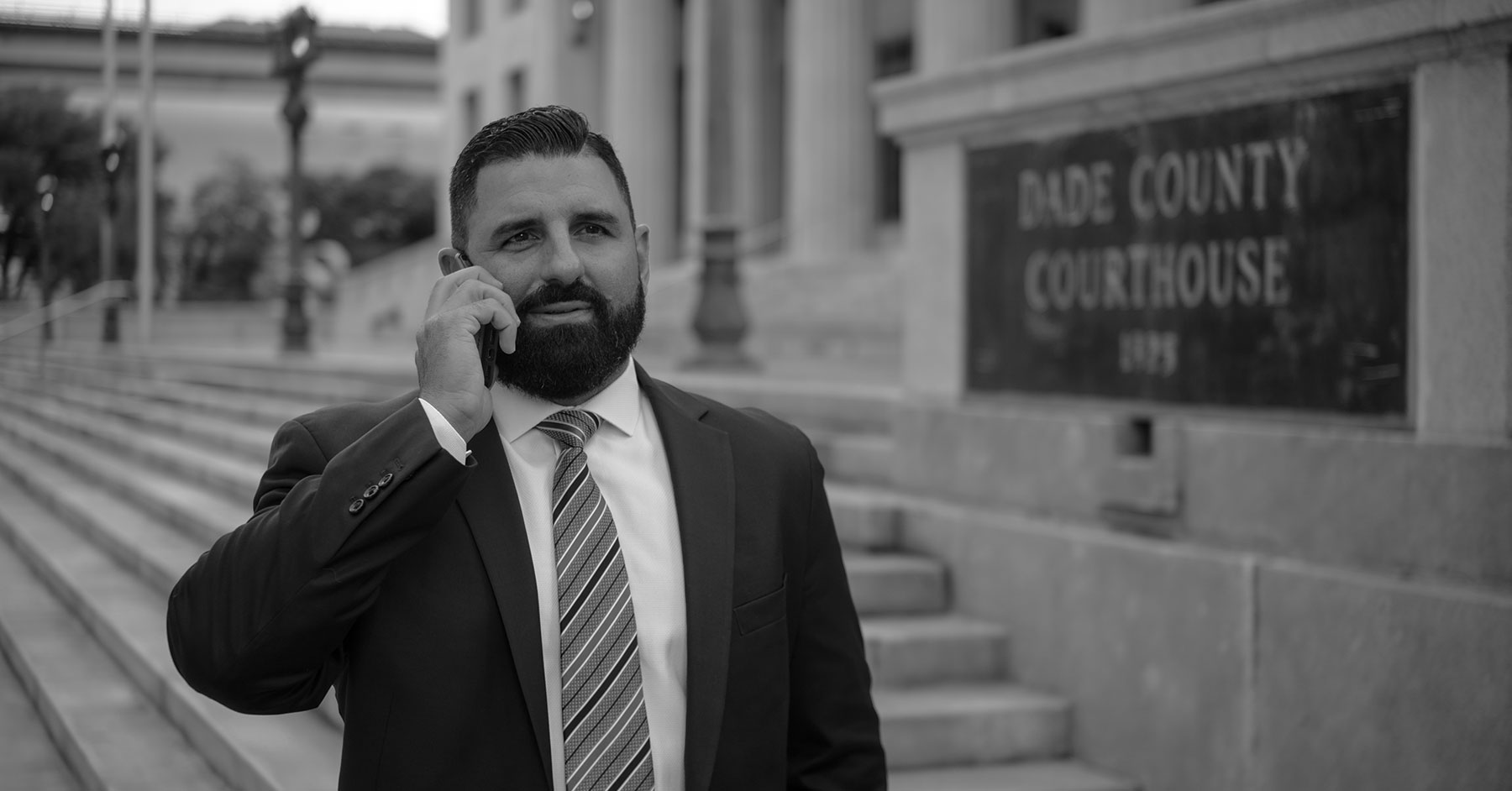Miami Lakes Violent Crimes Attorney
A Violent Crimes Defense Attorney Protecting Your Rights and Freedoms in Florida

With an in-depth understanding of Florida’s criminal laws, including relevant statutes such as Chapter 776 (Florida’s Stand Your Ground law) and Chapter 784 (Florida’s Assault and Battery laws), Mr. Hassan is committed to protecting your rights and securing the best possible outcome for your case.
Whether you are facing charges related to assault, domestic violence, homicide, or any other violent offense, Mr. Hassan will diligently assess the evidence, investigate the circumstances, and craft a strategic defense strategy tailored to your unique situation.
Don’t hesitate to contact the Law Office of Nayib Hassan, P.A. at (305) 403-7323 or through our online contact form to schedule a consultation with a skilled violent crime attorney in Florida today.
Aggressive Defense Counsel for Violent Crimes in Florida
The criminal justice system seeks swift punishment for violent offenders. If you are charged with a federal violent crime, you face the harshest penalties of the law. Without experienced legal counsel, you could spend the rest of your life behind bars. At the Law Office of Nayib Hassan, P.A., we understand exactly what you are up against. To help you construct a solid criminal defense we leave no stone unturned. Whether you are arrested for kidnapping, murder, or any other violent offense, we are ready to help you fight back.
Types of Violent Crimes Nayib Hassan Will Defend
There are a plethora of different types of violent crimes which one can be accused of in the state of Florida. A number of them are as follows:
Assault and Battery
Assault and battery charges in Florida can arise from various circumstances involving the physical attack or harm caused to another person. The following are the different types of assault and battery charges that a violent crimes attorney like Nayib Hassan can defend against in the state:
- Simple Assault: This charge involves intentionally threatening another person with violence or engaging in conduct that creates a reasonable fear of harm. It is a second-degree misdemeanor in Florida, punishable by up to 60 days in jail and/or a fine of up to $500.
- Aggravated Assault: When an assault involves the use of a deadly weapon or the intent to commit a felony, it is classified as aggravated assault. This is a third-degree felony, carrying penalties of up to 5 years in prison and/or a fine of up to $5,000.
- Battery: Battery refers to the intentional and unlawful touching or striking of another person against their will, resulting in physical harm or injury. It can be charged as either a misdemeanor or a felony, depending on the severity of the offense and the presence of aggravating factors.
- Aggravated Battery: Aggravated battery occurs when a person intentionally causes great bodily harm, permanent disability, or disfigurement to another person. It is a second-degree felony, carrying penalties of up to 15 years in prison and/or a fine of up to $10,000.
Florida statutes that apply to assault and battery charges include:
- Florida Statute 784.011: Assault
- Florida Statute 784.021: Aggravated Assault
- Florida Statute 784.03: Battery
- Florida Statute 784.045: Aggravated Battery
The penalties for assault and battery convictions can vary based on the specific charge and the circumstances of the case. In addition to imprisonment and fines, individuals convicted of these offenses may also face probation, mandatory counseling, community service, and the potential for a permanent criminal record.
Domestic Violence
Domestic violence is a serious offense in Florida, and a violent crimes attorney like Nayib Hassan can provide legal representation to individuals facing allegations of violence or abuse within a domestic or familial relationship. The following are the circumstances and charges commonly associated with domestic violence:
- Spousal Abuse: This involves acts of physical violence, emotional abuse, harassment, or stalking between spouses or former spouses. Domestic violence between spouses is covered under Florida’s domestic violence statutes.
- Child Abuse: Child abuse refers to any intentional physical, emotional, or sexual harm inflicted upon a child. It includes actions such as physical violence, neglect, or psychological abuse that impairs the child’s well-being.
- Elder Abuse: Elder abuse encompasses various forms of mistreatment, including physical, emotional, or financial harm inflicted upon elderly individuals. It can occur within family relationships or in caregiving settings.
Domestic violence charges in Florida can be prosecuted under different criminal codes, including:
- Florida Statute 741.28: Domestic Violence
- Florida Statute 827.03: Child Abuse
- Florida Statute 825.102: Abuse, Aggravated Abuse, or Neglect of an Elderly Person or Disabled Adult
The penalties for domestic violence convictions can vary depending on the severity of the offense and the defendant’s prior criminal history. In general, domestic violence charges can range from misdemeanors to felonies, carrying the following potential penalties:
- Incarceration: Defendants can face imprisonment ranging from a few days up to several years, depending on the nature and severity of the offense.
- Protective Orders: The court may issue restraining orders or injunctions that restrict the defendant’s contact with the alleged victim.
- Counseling or Treatment: Defendants may be required to attend counseling or complete anger management programs as part of their sentence.
- Fines and Restitution: Monetary fines can be imposed, and defendants may be required to pay restitution to the victim for any damages or expenses incurred.
Aggravated Assault
Aggravated assault is a serious offense that involves the use of a deadly weapon or the intent to commit a felony during an assault. Nayib Hassan, a skilled violent crimes attorney, provides legal representation to individuals facing charges of aggravated assault in Florida. Here are some important details regarding the circumstances, criminal codes, and potential penalties associated with aggravated assault:
Circumstances: Aggravated assault charges can arise in various situations, including but not limited to:
- Use of a Deadly Weapon: When a person uses a weapon capable of causing serious bodily harm or death, such as a firearm, knife, or other dangerous objects, in an assault.
- Intent to Commit a Felony: If the assault is carried out with the intention of committing another felony offense, such as robbery, sexual battery, or burglary.
Criminal Codes: In Florida, aggravated assault is primarily governed by the following criminal code:
- Florida Statute 784.021: Aggravated Assault
This statute defines the elements and penalties for aggravated assault in the state.
Penalties: The penalties for aggravated assault can vary depending on several factors, including the severity of the offense, the use of a deadly weapon, and the defendant’s criminal history. Possible penalties for aggravated assault in Florida include:
- Felony Conviction: Aggravated assault is generally classified as a third-degree felony in Florida.
- Incarceration: Defendants convicted of aggravated assault can face imprisonment for up to five years.
- Probation: In some cases, the court may impose a probationary period with specific conditions, such as attending counseling, completing anger management programs, or maintaining good behavior.
- Fines: Defendants may be required to pay fines as determined by the court. The amount of the fine can vary based on the circumstances of the case.
Sexual Assault
Sexual assault is a grave offense that involves non-consensual sexual acts or engaging in sexual activity with individuals who are incapable of giving consent. Nayib Hassan, an experienced violent crimes attorney, is dedicated to providing strong legal representation to individuals facing charges related to sexual assault in Florida. Here are important details regarding the circumstances, criminal codes, and potential penalties associated with sexual assault:
Circumstances: Sexual assault charges can arise in various situations, including but not limited to:
- Rape: Engaging in sexual intercourse without the consent of the other person through force, threat, coercion, or when the victim is unable to give consent.
- Sexual Battery: Committing non-consensual sexual acts, including oral, anal, or vaginal penetration, using force, violence, or threats.
- Statutory Rape: Engaging in sexual activity with a person who is under the age of consent, even if the encounter is consensual. The age of consent in Florida is 18 years old.
Criminal Codes: In Florida, sexual assault offenses are primarily governed by the following criminal codes:
- Florida Statute 794: Sexual Battery
- Florida Statute 800.04: Lewd or Lascivious Offenses Committed Upon or in the Presence of Persons Less than 16 Years of Age
These statutes define the elements of sexual assault crimes and establish the related penalties in the state.
Penalties: The penalties for sexual assault offenses can vary depending on the specific charges, aggravating factors, and the defendant’s criminal history. Possible penalties for sexual assault in Florida include:
- Felony Conviction: Sexual assault offenses are generally classified as felonies in Florida, ranging from second-degree to first-degree felonies, depending on the severity of the offense.
- Incarceration: Convictions for sexual assault can lead to significant prison sentences, ranging from several years to life imprisonment, depending on the nature of the offense and the presence of aggravating factors.
- Sex Offender Registration: Defendants convicted of sexual assault crimes may be required to register as sex offenders, which can have long-lasting consequences on various aspects of their lives, including employment, housing, and personal relationships.
- Probation and Supervised Release: In some cases, the court may impose a period of probation or supervised release, during which the defendant must comply with specific conditions and restrictions.
Kidnapping
Federal jurisdiction applies to kidnapping cases under the following circumstances:
- The victim is willfully transported in interstate or foreign commerce
- The crime occurs within the special maritime and territorial jurisdiction of the United States
- The crime occurs within the special aircraft jurisdiction of the United States
- The victim is a foreign official, an internationally protected person, or an official guest as those terms are defined in 18 U.S.C. § 1116(b)
- The victim is a Federal officer or employee designated in 18 U.S.C. § 1114
- International parental kidnapping in which the victim is a child under the age of 16 years.
In most cases, federal jurisdiction does not apply to kidnapping cases where a minor child is taken by a parent. However, federal charges may be brought if the child is under 16 and taken abroad.
Carjacking
While carjacking is prosecuted on both the state and federal level, many carjacking offenders are charged in federal court. According to 18 U.S.C. § 211, carjacking is a serious offense punishable by up to 15 years in prison. If bodily injury occurs, the penalty becomes up to 25 years in a federal prison. In the event that the carjacking results in a death, you face up to life imprisonment or death. Keep in mind that you may also face costly fines depending on the details of your case.
Federal Charges for Murder
Murder is the most serious crime in the criminal justice system. Federal charges may be brought against a defendant accused of the following:
- Drug-related murders
- Murder for hire
- Murder of a federal judge or law enforcement agent
- Killing of an immediate family member of a law enforcement official
- Murder of an elected/appointed federal official
- Murder to influence the outcome of a court case
- Murder committed during bank robbery
- Murder related to rape, or the sexual exploitation of children
- Murder aboard a ship
- Murder by mail
If you arrested on federal murder charges, you need experienced legal help. Without the right lawyer by your side, you risk your reputation and freedom.
When to Contact a Federal Criminal Defense Lawyer
Nothing is more important than picking up the phone and contacting a criminal defense attorney after being accused of or arrested on a criminal charge. Even if you haven’t been arrested yet and the police are simply investigating their suspicions, it is in your best interest to pursue legal counsel as soon as you are able to.
At the Law Office of Nayib Hassan, we know that bargaining for lesser charges is often not in the best interest of the client. Many prosecutors will put the pressure on in order to secure a guilty plea, often leading the accused into believing that there’s no way they will be found innocent in a court of law. However, our clients often stand the best chance of being proven innocent or having the charges dropped if we proceed with a trial.
We’ll investigate the evidence available in your case and will exhaust every possible resource in order to put together a strong, compelling defense that meets the prosecution at every turn. We will fight zealously for your rights under the law, regardless of the crime you have been charged with.
Don’t wait to get legal help if you or someone you love have been arrested for a crime or have been accused of committing a crime. Contact Law Office of Nayib Hassan today for a consultation to discuss the details of your case and to determine what the next best step should be.


